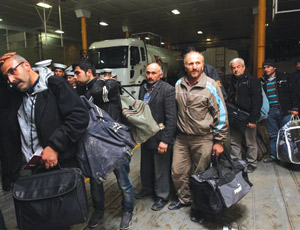Global design and construction firms were again caught up in increasingly violent protests in the Middle East, this time in Libya, as companies scrambled to shut down projects and evacuate expatriates amid much uncertainty as to when or whether they would return to restart work—and under what government.

Industry firms from Turkey were particularly hard-hit, since Libya ranks, after Russia, as the second most important market for Turkish contractors, industry sources say. The estimated value of firms’ ongoing projects there is between $15 billion and $20 billion. Further, there were 22 Turkish firms reporting work in Libya in 2009, more than from any other country, according to ENR data.
In the last two years, Turkish contractors have undertaken 124 projects in Libya with an overall value of $7.6 billion, say Turkish embassy sources in Tripoli.
Turkey launched a massive evacuation effort: 17,157 citizens and 577 foreign nationals employed by Turkish firms were removed by air and sea as of March 1, says the country’s Foreign Ministry. Non-Turkish citizens were mostly from Thailand, the Philippines, Pakistan and Vietnam.
Several Turkish-run construction sites have been raided by looters who burned or stole equipment and vehicles. Istanbul-based Tekfen Construction and Installation Co. says various heavy equipment and vehicles were taken on Feb. 21 from its main site at Kufra, where the firm had been working since 2006 on the so-called Great Man-Made River project. Tefken says it halted work and evacuated 1,197 foreign employees, including 407 Turks.
Tekfen announced in early March that it has a 67% share of the $535-million project, which aims to convey to the Mediterranean coast underground water extracted from below the Sahara Desert. At year-end 2010, the firm had completed $218 million of its project share, with about $140 million still unfinished. “This represents 7.5% of Tekfen Construction’s active backlog at the end of the year,” it said.
Akfen Holding said it was evacuating employees from two Libyan airport terminal projects, in which it had a 25% share and 50% share, respectively. The contractor said there was no project damage and that the CEO of its Libya unit accompanied 128 employees evacuated by private jet to Istanbul.
U.S. firms are the second-largest contingent in Libya, based on ENR’s 2009 data, with 21 firms reporting work there.
Publicly held AECOM had announced on March 1 that it expects to record a charge in its second quarter related to the shutdown of its work as program manager, since 2007, of Libya’s estimated $50-billion upgrade of housing and other infrastructure.
The firm, which has evacuated more than 250 expatriate managers and staff, expects to return when the turmoil subsides. “Day-to-day life is not now focused on anyone’s development program,” says one company executive. “But any government that succeeds there will need to have a development program. We have an enormous depth to our relationships in Libya.”
Foster Wheeler Corp., another publicly held engineering-construction firm working in Libya, currently has no expats in country...





Post a comment to this article
Report Abusive Comment